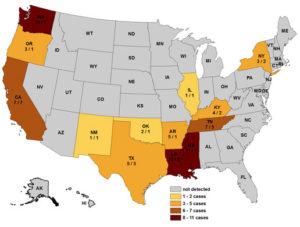by Dr. Kelly Hudspeth, DVM.
Is Coggins a disease in horses? Most people know that a Coggins test is required once a year in Louisiana on your horses. The test is called a Coggins test because the test has the last name of the man who developed the test. The Coggins test actually is a test for Equine Infectious Anemia (EIA), commonly called Swamp Fever. This test is an AGID (Agar Gel Immunodiffusion) test and was used for years. Today an Elisa (Enzyme Linked Immunosorbent Assay) test is often used because it takes less time, but the Elisa also has more false positives. If a positive occurs, the Coggins (AGID) test can be used to confirm the Elisa. The test is almost always referred to as a Coggins test even if the Elisa is the method used and the papers that show the results of the test are called Coggins papers.
EIA is caused by a virus. There is no vaccine and no cure. The virus is spread from horse to horse from blood sucking insects or it can be spread by using the same needles on more than one horse. There are different forms of the disease, with one form making the horse very sick. Another form may make the horse lose weight off and on over a period of time with many different problems that can occur, making it impossible to diagnose without a blood test. The third form is characterized with no signs. These horses are a dangerous source of infection because no one realizes they are sick.
The United States has made great strides in eliminating the disease. It is a reportable disease and is regulated. In 2015 only 69 positive horses were identified in the states, but it is a little concerning that 10 were in Louisiana. (2015 Equine Infectious Anemia Cases in the United States https://www.aphis.usda.gov/animal_health/downloads/animal_diseases/2015_eia_annual_final.pdf )
If you purchase a horse, it is a good idea to have the horse tested at the purchase date, because the test is in actuality only good for the day the blood is pulled, even though it is only required once a year. The horse may be positive today and get infected by a biting insect the next day.
A positive test for EIA is very difficult for owners not only because of quarantines, etc., but also because of the emotional aspect as well as economic loss. The recommended action for a positive horse is euthanasia so the diagnosis can be devastating to an owner.
If a horse is positive, the other horses kept in close contact are at risk. This could be horses in a pasture, stable, or at horse events held all over the nation. This is why boarding or breeding facilities and equine events require a negative Coggins test. All horse owners should require a negative test before allowing other horses to enter their facilities. The negative papers should always be with the horse during transportation.
An interesting fact about Equine Infectious Anemia is that it is caused by a retrovirus, the same type virus that causes human HIV (Human Immunodeficiency Virus). Studies involving EIA have provided information that can be used in the battle against HIV.
This is only a short summary when it comes to the clinical signs, regulations, and economic costs related to Equine Infectious Anemia. Although a Coggins test is only required at various times for different events or ownership, the test is good for the day it is drawn in reality.
Photo: Number of EIA cases/Number of affected premises, 2001-2015 (www.aphis.usda.gov)







I was able to find good advice from your articles.
Your post is valuable , thanks for the info http://myhealthandwellness.pen.io
It’s a shame you don’t have a donate button! I’d most certainly donate to this excellent blog!
I guess for now i’ll settle for bookmarking and adding your RSS feed to my Google account.
I look forward to fresh updates and will talk
about this website with my Facebook group. Chat soon!
Many thanks, this website is really practical. http://bit.ly/2f0xJ92
You’ve fantastic info on this website. http://tinyurl.com/j7a425c